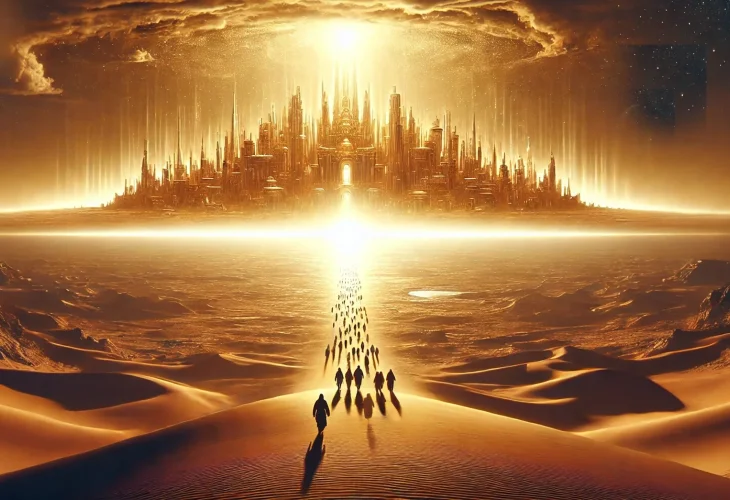From Pharaoh's Paradise to a Promise of Freedom
Ancient Egypt was a lavish paradise—if you were in charge. Let's unravel how this 'Garden of the Wicked' transformed into the backdrop for a revolution that reshaped history.
- יהוסף יעבץ
- פורסם י"א שבט התשפ"ה

#VALUE!
Imagine a place where lush growth is eternal. Farmers never await rain, as a constant, everlasting water supply nourishes the land: "A river flows from Eden to water the garden," its branches streaming through countless channels irrigating fields abundantly, producing more than enough for its inhabitants. This place, rich and opulent with towering pyramids sheathed in gold, is indeed the land of Egypt. In genesis, it’s depicted as the Lord’s garden, a paradise.
Humankind was exiled from the Garden of Eden to amend itself, to become worthy of return in the end of days. Yet Genesis outlines a trail of further failures. Cain murders his brother and is condemned to wander; the flood generation corrupts its ways; the builders of Babel ignore the lessons and rely on their monumental creations—until Abraham appears and calls upon Hashem.
Abraham discovered the path to lead humanity back to Eden, beginning with the trials faced by his descendants in the "paradise" of the wicked. Egypt was a paradise, yet for the wicked. The serpent, once the emblem of temptation in Eden, became revered and sacred in Egypt. The inhabitants of Egypt's paradise, beside the great river, aligned themselves with the serpent.
The blessing upon Adam and Eve, "Be fruitful and multiply, fill the earth," was realized in the children of Israel: "The Israelites were fruitful and prolific; they multiplied and grew exceedingly strong, so the land was filled with them." Pharaoh, considering himself a deity, reversed these precepts. Humanity was cast out of Eden by its Creator because it followed its own desires—"Behold, the man has become like one of us," heeding the advice of the serpent, making the daring choice to be "like gods." Hence, the Creator barred them from Eden’s gates, guarded by cherubs. Pharaoh noted, "The Israelite people are more numerous and stronger than we," thus barring man within the gates of his "paradise," with Ba'al Zephon as the warden. Entry into the paradise of the righteous is impossible; exit from the paradise of the wicked is hopeless.
The Creator cursed Adam to toil the fields in sweat, while Pharaoh compelled the children of Israel into harsh labor. He sought to remove the curse of work from himself by forcing others to labor on his behalf. The builders of Babel yearned to be godlike through bricks and tar; Pharaoh aspired similarly, forcing others to construct his monumental edifices, attempting to prove his dominion over the world.
The reversal deepened, likening Moses’s defense of his beaten brethren to Cain; a man marked by Pharaoh to be slain by all. Striving to liberate his kin from the Egyptians, Moses mirrored Abraham who saved Lot from the wicked kings. This echoed his mission to restore Abraham’s legacy.
Hints of Moses' mission appeared since his birth: "She saw that he was good," reminiscent of when Hashem saw light was good in creation’s genesis. In the darkness of exile, redemption kindled. Hashem nurtures the light of Mashiach; "And these are the names of the sons of Israel" evoking Adam’s naming. Moses in a tar-coated basket echoes Noah’s ark. Thus unfolds Israel’s redemption—incrementally. Unique to the narratives of oppression, Hashem’s name—aside from Elokim—is obscured, acting unseen among his creations.
Symbols seen in the patriarchs culminate in Moses. Spotting the burning bush, he "sees the place from afar" akin to Abraham at Mount Moriah, hears the angel’s voice as Abraham did. Carrying his son on a donkey, he gently parallels Isaac’s binding. Exhibiting strength at the well like Jacob, and later tending flocks like his forefathers, he arrives as a foreigner, marrying the priest’s daughter, akin to Joseph.
The cries of Israel reach Hashem, akin to Sodom’s despair, prompting divine intervention. Hashem sends Moses, who subdues Egypt’s worshiped serpent by reducing it to a mere staff. Afflicting Pharaoh like with Abraham. The hasty Exodus mirrors Sodom’s escape, amidst pillars of cloud and fire. Egyptians drown akin to the flood generation. Israelites consume manna as in Eden, where sustenance was complete.
Scripture describes this as a "new genesis": "This month shall mark for you the beginning of months," a fresh start. Settling into calm, Israel receives the Shabbat commandments, akin to creation’s finale: "Therefore Hashem blessed the Shabbat day and hallowed it."

